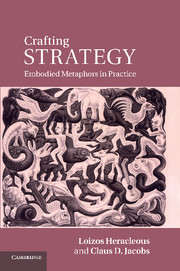Book contents
- Frontmatter
- Contents
- List of figures
- List of tables
- Preface
- Acknowledgments
- Vignette A BASF PerForm
- Vignette B UNICEF
- Vignette C Project Voltigo
- 4 Crafting strategy as a practice of embodied recursive enactment
- 5 Play, analogical reasoning and dialogue in the crafting of strategy
- Vignette D Hephata Foundation
- Vignette E Privatbank IHAG Zürich AG
- Vignette F World Vision New Zealand
- Glossary
- Index
- References
5 - Play, analogical reasoning and dialogue in the crafting of strategy
Published online by Cambridge University Press: 05 June 2011
- Frontmatter
- Contents
- List of figures
- List of tables
- Preface
- Acknowledgments
- Vignette A BASF PerForm
- Vignette B UNICEF
- Vignette C Project Voltigo
- 4 Crafting strategy as a practice of embodied recursive enactment
- 5 Play, analogical reasoning and dialogue in the crafting of strategy
- Vignette D Hephata Foundation
- Vignette E Privatbank IHAG Zürich AG
- Vignette F World Vision New Zealand
- Glossary
- Index
- References
Summary
In the previous chapter, we developed a concept of crafting strategy as embodied recursive enactment by drawing on theoretical/conceptual antecedents, namely physiological, psychological and communicative aspects of crafting. In this chapter, we extend and nuance this line of reasoning by exploring three social practices that are crucial to crafting strategy as embodied recursive enactment.
First and in terms of the physiological/manual dimension, we explore the concept of play as a human capacity that in our context consists mainly in the relaxation of rational intentionality and manipulation of objects in order to discover new insights. Secondly, and in terms of the cognitive/psychological dimension, we explore the human capacity of analogical reasoning, in our case through the process of constructing and interpreting physical analogs. Thirdly, and in terms of the communicative dimension, we discuss the concept of dialogue as a specific communicative mode that allows for reflective as well as generative meaning negotiation.
Crafting strategy draws on and mobilizes these three related, yet distinct practices in terms of embodied recursive enactment. We present each of them in a separate section and illustrate with empirical examples. Table 5.1 summarizes these considerations.
Playing seriously: relaxing rational intentionality and manipulating objects
Serious play as a technology of foolishness
Strategy formation has intentional as well as emergent aspects. Typically, intentionality in strategy research refers to actions that are deliberately directed towards the achievement of some purpose.
Information
- Type
- Chapter
- Information
- Crafting StrategyEmbodied Metaphors in Practice, pp. 90 - 114Publisher: Cambridge University PressPrint publication year: 2011
